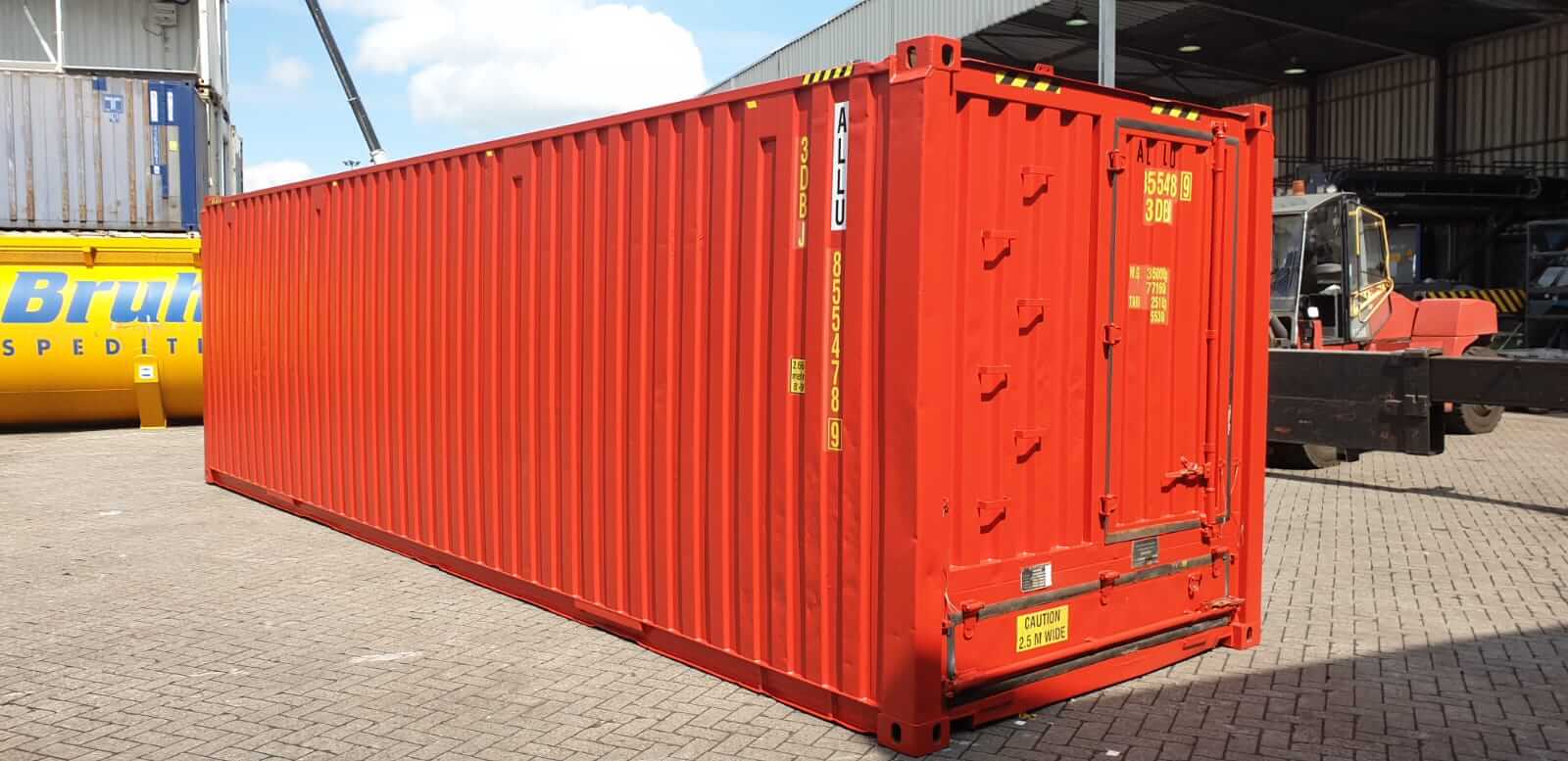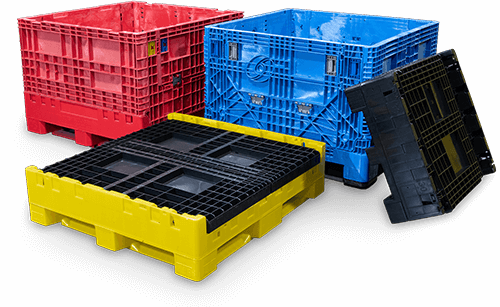Why Mass Containers Are Vital for Sustainable and Cost-Effective Transportation
Bulk containers play an important role in contemporary logistics. They facilitate the efficient activity of big amounts of products, therefore optimizing transport procedures. This technique not just decreases expenses however likewise reduces environmental influence via lower exhausts and waste generation. As sectors seek more lasting methods, the adoption of mass containers is becoming progressively considerable. What ramifications does this change hold for future logistics and supply chain management?

The Advantages of Making Use Of Mass Containers in Logistics
Mass containers transform logistics by boosting effectiveness and sustainability. These containers enable for the transport of big quantities of products in a single trip, significantly minimizing the number of journeys called for. This not only streamlines operations yet likewise reduces labor prices connected with handling, packing, and discharging. Furthermore, mass containers are developed to enhance room use within transportation automobiles, guaranteeing that more items can be shipped simultaneously.
The standardization of mass containers additionally simplifies the logistics procedure. With uniform dimensions, they can be conveniently piled and kept, resulting in enhanced storage facility administration. Mass containers commonly include long lasting products that protect contents from damages during transit, thereby lowering item loss and enhancing overall reliability. Because of this, companies can experience enhanced supply chain performance, eventually bring about boosted profitability and consumer satisfaction. This mix of aspects makes mass containers a crucial property in contemporary logistics.
Ecological Influence: Lowering Waste and Carbon Footprint
As markets significantly focus on sustainability, the adoption of bulk containers has actually become an essential approach for minimizing waste and reducing carbon footprints. These containers decrease the usage of product packaging materials, such as boxes and plastic, therefore notably reducing overall waste generation. By consolidating deliveries, bulk containers boost transportation performance, enabling more items to be transported per trip. This reduction in trips straight associates with lower greenhouse gas discharges, contributing to a smaller carbon impact.
Mass containers can commonly be reused or recycled, even more alleviating ecological influence. The durability of these containers warranties they can withstand numerous transport cycles, minimizing the requirement for single-use choices. used collapsible containers. By streamlining logistics and promoting reliable resource use, bulk containers not only support sustainable methods but likewise urge markets to straighten with worldwide ecological objectives. Inevitably, their application shows a dedication to environmental stewardship and responsible source administration
Cost Financial Savings: How Bulk Containers Lower Transport Expenditures
While numerous business seek means to improve their bottom line, using mass containers offers a considerable chance for lowering transportation expenses. Mass containers make best use of the quantity of items transported, allowing businesses to deliver larger amounts simultaneously. This effectiveness minimizes the variety of journeys required, straight reducing gas costs and reducing labor expenses related to loading and unloading.
In addition, mass containers commonly include streamlined designs that optimize room use within transportation lorries. This means fewer voids, resulting in much more effective use available capacity. Furthermore, the longevity of bulk containers can decrease the threat of product damages throughout transportation, guaranteeing and lowering losses that more items show up intact.
Enhancing Supply Chain Efficiency With Mass Storage Space Solutions
Mass storage space options play a vital function in boosting supply chain effectiveness by maximizing supply administration. By combining goods into less, bigger containers, businesses can greatly minimize handling costs linked with frequent transfers and processing. This structured strategy enables for far better tracking and management of inventory, inevitably leading to enhanced functional efficiency.
Streamlined Supply Management
Efficient supply management is necessary for maximizing supply chain operations, especially when organizations embrace bulk storage services. These remedies allow businesses to preserve greater supply degrees while lessening the frequency of replenishment. By combining products right into mass containers, companies can improve their supply procedures, lowering the intricacy linked with tracking numerous smaller packages. This strategy helps with accurate supply matters and boosts projecting accuracy, enabling for more enlightened decision-making. In addition, mass storage options streamline stockroom organization, making it easier to locate and access items when required. As an outcome, companies can achieve a more effective stock turn over rate, eventually enhancing general supply chain performance and lowering the probability of stockouts or overstock circumstances.

Reduced Handling Costs
The execution of mass storage remedies not only simplifies inventory management but additionally substantially lowers dealing with prices across the supply chain. By consolidating products right into mass containers, firms minimize the need for regular handling and transfer in between different storage space and transportation systems. This strategy reduces labor costs linked with loading, dumping, and relocating smaller sized plans. In addition, mass storage lowers the regularity of shipments, bring about reduced transport prices and reduced gas consumption. As an outcome, services can maximize their logistics procedures, permitting a much more effective allotment of sources. Eventually, decreased managing prices add to improved overall supply chain efficiency, promoting an environment that sustains both sustainability and financial feasibility.

Adaptability of Mass Containers Across Different Industries
Although numerous sectors have unique needs for transportation and storage, mass containers have actually emerged as a versatile option that satisfies a large range of needs. These containers, varying from huge containers to specialized tanks, can suit diverse materials, including liquids, powders, and granules. In the farming industry, mass containers assist in the transport of plant foods and grains, while the food and drink industry uses them for active ingredients and finished items. The chemical market counts on bulk containers for safely moving dangerous materials, guaranteeing compliance with safety laws. Furthermore, construction firms profit from bulk containers for delivering aggregates and various other products. Their flexibility includes different modes of transport, consisting of trains, trucks, and ships, enhancing logistical efficiency. This adaptability not only simplifies procedures throughout various fields but also advertises sustainability by reducing packaging waste and enhancing room in transit. Mass containers play an important duty in modern-day supply chain monitoring.
Future Fads in Mass Container Use and Sustainability
The future of mass container usage is increasingly formed by ingenious products development that improves sustainability. Furthermore, automation in logistics promises to enhance procedures, lowering waste and enhancing efficiency. Embracing round economy methods will certainly even more transform exactly how bulk containers are created, utilized, and recycled, fostering an extra sustainable transportation landscape.
Innovative Products Advancement
As markets progressively prioritize sustainability, innovative materials development in mass containers becomes a substantial variable in boosting environmentally friendly transportation services. Suppliers and scientists are discovering eco-friendly plastics, recycled composites, and lightweight metals to lower environmental influence. These materials not only decrease waste yet additionally improve fuel performance by lowering the overall weight of containers. Furthermore, innovations in wise products, which can adapt to varying problems, improve the longevity and capability of bulk containers. The assimilation of these ingenious materials straightens with circular economic situation concepts, advertising reuse and recycling. As the need for sustainable methods expands, the development of such materials will certainly play an essential role in shaping the future of mass container use in logistics and transport.
Automation in Logistics
Substantial improvements in automation are poised to transform logistics and the usage of bulk containers, enhancing sustainability in transport. Automated systems, including drones and autonomous vehicles, are streamlining the activity of mass containers, reducing the dependence on traditional fuel-powered transportation. These modern technologies maximize transmitting and loading procedures, lessening empty miles and enhancing fuel efficiency. In addition, automated inventory monitoring systems boost tracking and monitoring of bulk containers, making sure far better source allotment and reduced waste. The integration of the Web of Things (IoT) allows real-time data analysis, enabling aggressive decision-making that straightens with sustainability objectives. As automation continues to evolve, it is anticipated to drive even more innovations wholesale container use, inevitably supporting even more sustainable logistics techniques and minimizing the environmental effect of transportation.
Circular Economy Practices
Improvements in automation are setting the stage for an extra integrated strategy to circular economic situation methods in the domain name of bulk container use. As markets increasingly welcome sustainability, bulk containers are being designed for longevity and reusability. This shift not only lessens waste however likewise boosts resource performance. Business are taking on strategies such as closed-loop systems, where utilized containers are accumulated, reconditioned, and reintroduced into the supply chain. Additionally, clever innovations track container life process, helping with much better monitoring and reducing environmental effect. The partnership in used collapsible bulk containers between makers, logistics companies, and end-users is necessary in developing criteria for lasting container usage. refurbished bulk containers. Future trends indicate a growing emphasis on materials that are biodegradable and recyclable, additional strengthening the round economic situation's principles in bulk transportation

Frequently Asked Questions
What Products Are Bulk Containers Generally Made From?
Bulk containers are commonly constructed from durable products such as high-density polyethylene, steel, aluminum, and cardboard. These products offer versatility, defense, and strength, making them appropriate for transferring numerous goods in various industries effectively.
Just how Do I Select the Right Dimension Bulk Container?
Selecting the right dimension bulk container involves evaluating the volume of products to be carried, thinking about taking care of tools compatibility, and evaluating storage room needs. Correct dimension guarantees efficiency in transport and decreases waste throughout shipment.
Are Bulk Containers Reusable or Recyclable?
Bulk containers are often multiple-use, made for several trips, enhancing sustainability. Many can likewise be recycled, depending upon the materials used. Picking recyclable choices even more lowers and supports ecological goals waste in transport methods.
What Safety Rules Put On Mass Container Transport?
Safety regulations for mass container transportation consist of compliance with the Department of Transportation guidelines, correct labeling of dangerous products, architectural integrity analyses, and adherence to weight limitations to guarantee secure handling and protect against mishaps during transit.
How Can Organizations Shift to Making Use Of Bulk Containers Efficiently?
Organizations can transform to bulk containers by examining current logistics, educating personnel on handling, investing in ideal devices, enhancing inventory management, and collaborating with providers to assure compatibility and efficiency throughout the supply chain.
As sectors progressively focus on sustainability, the adoption of mass containers has actually arised as an essential method for reducing waste and decreasing carbon footprints. By combining products into bulk containers, firms can streamline their inventory processes, lowering the intricacy associated with tracking multiple smaller sized plans. As industries progressively focus on sustainability, cutting-edge products growth in bulk containers emerges as a considerable aspect in boosting environmentally friendly transportation options. Automated systems, consisting of drones and independent vehicles, are improving the motion of bulk containers, minimizing the dependence on typical fuel-powered transportation. In addition, automated supply monitoring systems boost monitoring and monitoring of mass containers, making certain better resource allowance and lowered waste.